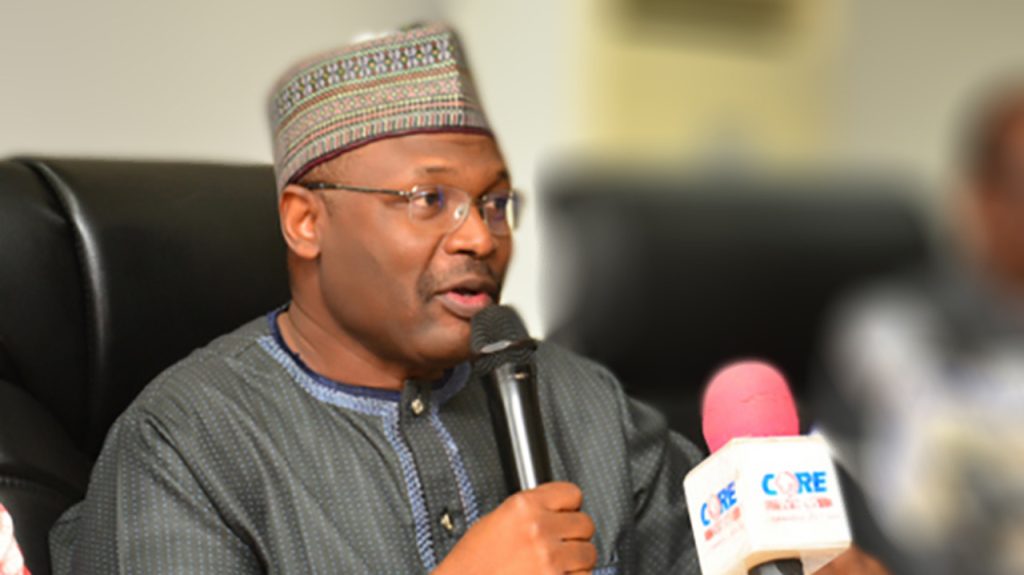By Harry Awurumibe, Editor, Abuja Bureau
Chairman of Nigeria’s electoral body, the Independent National Electoral Commission (INEC), Professor Mahmood Yakubu has charged the new Resident Electoral Commissioners (RECs), to focus on how they can acquaint themselves more with the processes and procedures of the Commission in order to deliver credible elections.
Yakubu gave the charge at an induction retreat for new RECs in Lagos, emphasizing the importance of reviewing performance, innovation, and capacity building for better service delivery.
The retreat also marked the induction of 10 new RECs; nine of them were sworn-in on December 12, 2023 while one REC was sworn-in on January 30, 2024 just as it brought together various stakeholders, including National and Resident Commissioners, Development partners, and media representatives.
Yakubu urged old RECs, to leverage on privileged field experience to contribute on how to mitigate recurring challenges in the areas of pre-election and post-elections litigations, operational issues especially in the area of logistics, improvement on voter education processes, issues of strategic communication and combating fake news, misinformation and disinformation as well as inclusivity in the electoral process.
The INEC boss highlighted the importance of the retreat as not just an induction for new appointees but as an opportunity to review performance, discuss innovations, and engage with lawmakers on critical areas of reform.
He noted that the retreat is part of a series of similar events organized by INEC over the past two years, aimed at improving the commission’s organizational capacity and service delivery.
Identifying several persistent issues, Yakubu called for a focus on mitigating pre-election and post-election litigations, enhancing voter education, improving strategic communication, combating fake news and misinformation, and promoting inclusivity in the electoral process. He emphasized the need for leveraging technology in election processes, addressing political party crises, and improving the recruitment and training of election duty officials.
In addressing these challenges, Yakubu proposed several solutions including:
(1)Enhanced Voter Education: Developing more effective voter education campaigns to ensure voters are well-informed about the electoral process and their rights. This includes utilizing multiple media platforms and community engagement strategies to reach a broader audience.
(2) Strategic Communication: Strengthening INEC’s communication strategy to combat misinformation and disinformation. This involves working closely with media partners and employing real-time fact-checking mechanisms.
(3) Inclusivity in the Electoral Process: Implementing measures to ensure all eligible voters, including marginalized groups, can participate in the electoral process. This includes making polling units more accessible and ensuring voter registration processes are inclusive.
(4) Leveraging Technology: Integrating advanced technologies in pre-election activities and Election Day processes to enhance transparency and efficiency. This could involve digital voter registration systems and electronic voting methods where feasible.
(5) Operational Improvements: Addressing logistical issues through better planning and resource allocation. This includes timely distribution of election materials and ensuring adequate training for electoral staff.
(6) Legal Reforms: Engaging with the National Assembly to push for necessary legal reforms that will strengthen the electoral process. This involves advocating for changes that will address identified gaps and improve overall electoral integrity. READ ALSO:
- Nigeria: Is Egalitarian Society A Mirage In Our Clime?
- NSC appoints Yusuf Ali CEO Elite Athletes Development Board
- NCC approves 50% tariff adjustments for telecom operators
- Donald Trump sworn in as United States President
- BREAKING: Trump takes oath, begins 2nd term as U.S. President
He however acknowledged the support of Development Associates Inc. (DAI) and the International Foundation for Electoral Systems (IFES) in organizing the retreat and their commitment to a transparent and inclusive electoral process in Nigeria.
As the retreat continues, participants are expected to engage in solution-oriented discussions, leveraging their experiences and expertise to propose actionable steps that will enhance the credibility and inclusivity of future elections.
The retreat aims to equip RECs with knowledge and skills to excel in their roles, with discussions centred on improving electoral processes.
Yakubu urged participants to engage actively and contribute to enhancing Nigeria’s electoral landscape.


